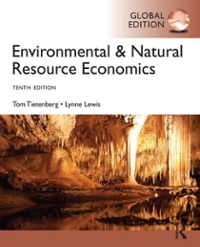Question
1. Consider the market for bicycles.The demand is given by P= -1.5Q D + 60.Suppose that the price changes from $15 to $30. What additional
1. Consider the market for bicycles.The demand is given by P= -1.5QD+ 60.Suppose that the price changes from $15 to $30.
What additional information would you need to consider if you wanted to knowwhether bicycles are a normal or an inferior good?
2. Use a correctly labelled supply and demand diagram to illustrate the eect of the given changeon the equilibrium price and quantity in the specied competitive market.
a) In mid July anunexpected temporary heat wave hits the East Coast of Canada. Show the eect in the ice cream market in Nova Scotia.
b)The government introduces a tax on ice cream which is paid by producers. What is the eect in the ice cream market?
c)Mexico is a major producers of textiles. The new COVID-19 variant has negatively impacted the health of manyfactory workers in Mexico.Show the eect on the market for Mexican textiles.
d)Suppose the government imposes a price controlon rice, as it is considered a necessity. Show the eect in the market for rice.
3. Snowspoils the cherry crop. As a result, the prices of cherries in the market rise from $4to $6a box.
As an economist, how would you justify this change in price?
4. The income elasticity of demand for doughnuts is equal to 1.2, you read in the newspaper that there is an economic slow down due to a new COVID-19 variant. Youare interested in how this will affect your doughnut business.
Holding everything else constant, discuss what you anticipate to happen to the demand for doughnuts in the economy.How will this affect your profit levels? Are doughnuts normal or inferior goods given this information?
5. Elizabeth owns the Sweet Alps Chocolate store. She charges $10 per pound for her hand made chocolate. You, the economist, have calculated the elasticity of demand for chocolate in her town to be 2.5. If she wants to increase her total revenue, what advice will you give her and why?
6. Compare the size of area of ABCG and FGDE for unit elastic demand, elastic demand, and inelastic demand.

Step by Step Solution
There are 3 Steps involved in it
Step: 1

Get Instant Access to Expert-Tailored Solutions
See step-by-step solutions with expert insights and AI powered tools for academic success
Step: 2

Step: 3

Ace Your Homework with AI
Get the answers you need in no time with our AI-driven, step-by-step assistance
Get Started


